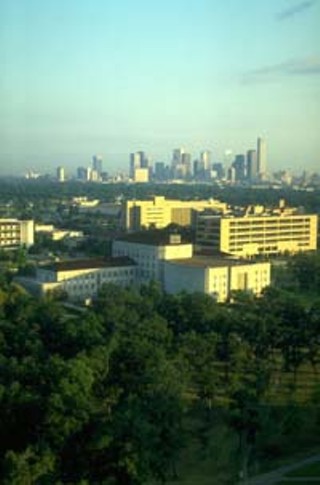The University of Houston
By Lissa Richardson, Fri., April 21, 2000

The University of Houston's graduate program in creative writing is a model for other writing programs across the country. In U.S. News and World Report's ranking of the nation's creative writing programs, U of H ranked No. 2, tied with Johns Hopkins University, and just below Iowa. The program's competitive application process attests to its success; hundreds of writers from across the country, indeed the world, are turned down every year. Only 10 poets and 10 fiction writers are selected for admission each fall.
The faculty is evidence of the program's excellence -- all faculty members have won major awards and are prolific in their writing, but those with whom I spoke seemed deeply vested in their students. Professor and poet Mark Doty, for example, has been recognized with the T.S. Eliot Prize, the National Book Critics Circle Award, the Lambda Literary Award, and many fellowships. He has taught at Columbia, the University of Iowa, Sarah Lawrence, and the University of Utah. Yet when asked what he is most proud of since coming to the University of Houston, he says, "The thing that pleases me most is working with these groups of exceptional students. ... I get paid to do something I'd mostly do just for the pleasure of it." Novelist Kathleen Cambor, the director of the program and a graduate of the U of H program, also uses the word "privilege" when discussing her students, and says, "My students are amazingly bright, committed, thoughtful people. ... Their determination to make a life in art is very impressive, very touching to me."
One thing that makes the U of H program different from others is that it offers numerous degrees -- the M.A., the M.F.A. and the Ph.D. -- and this format for the program enables students to study and write without, Doty says, much competition between each other. Each degree requires a completed creative dissertation or thesis, and the M.A. and the Ph.D. require studies of literature, theory, and criticism in addition to creative writing. Since many students pursue the Ph.D., they remain at the university longer than most students at other writing programs. This helps to increase the sense of community, permanence, and place for the writers who are studying there. Chris Haven, a Ph.D. student in the program, appreciates the opportunities to workshop with fellow students for long periods of time. Last year, he was involved in a novel-writing workshop that ran from spring to fall. "We kept roughly the same members in the workshop," Haven said, "and we've really guided each other through what for most of us is a first novel." This type of focused, lengthy workshop is rare.
In addition to workshops and curriculum, many U of H students are granted teaching assistantships and fellowships in order to help them pay for their education. One program that positively affects many students is a nonprofit community organization called Inprint Inc., which has independently raised money for fellowships and an endowed chair. Haven calls Inprint "extraordinarily generous" and says that the organization is "a necessity in Texas since the Legislature does not seem to adequately fund higher education." Also, the university funds a well-known literary journal, Gulf Coast, which provides students with editorial experience.
Finally, the diversity of Houston itself seems to provide a source of experience and community for the students and the faculty, who come from all over the globe. Haven says that he has "appreciated the diversity of the setting of the University of Houston, both among my colleagues and my own students. Teaching in a nonwhite majority classroom setting has changed my life, and most certainly affected the perspective of my fiction." Doty thrives on Houston as an odd meeting place for so many different writers. "I like the fact that our students come from everywhere," he says, "often with a great deal of previous experience in creative writing programs, to Houston, this vast and unlikely city; there's a feeling that we're all outsiders here together."
The faculty is certainly diverse, from Doty and Cambor to Adam Zagajewski, who is internationally renowned for his poetry and political activism, and Chitra Divakaruni, who writes and teaches among multiple genres and focuses on multicultural literature. There are, of course, other outstanding names to list: Ed Hirsch, Cynthia MacDonald, Robert Phillips, Daniel Stern, playwright Edward Albee, and the visiting faculty. With this attention to diversity firmly rooted in the program, U of H continues to seek out new names and faces to provide additional expertise and experience to the students. Cambor's wish, if she could change anything about the program, would be to accept more students in the program than she does right now. Extra faculty is the key to this goal.
Rather than presenting themselves as writing gurus, neither Cambor nor Doty take much personal credit for their students' successes. Cambor thinks that a "teacher of writing functions as a kind of consultant and editor. ... At the end of the day, the work is [the writer's own], and the greatest help to them lies in teaching them to be good judges of their own prose styles and their own capacities." Doty says, "I do not believe that writing can be taught, exactly, but I have no doubt that it can be learned, and one of the best ways to do that is through immersing oneself in a community of fellow writers and readers."
How to apply: The entire application packet must be sent to the Creative Writing Program at the address below. It must be postmarked by January 1. Different requirements are set according to the program you plan to enter (M.A., M.F.A., or Ph.D.), but all applicants must include the following: official transcripts, three letters of recommendation, GRE scores, a statement of intent, and a creative manuscript, which should be 10 pages of poetry, maximum, or 20-25 pages of fiction. Applications are mailed biweekly and are not available online.
Deadline: Jan. 1; admission is for fall semester only.
Address: Creative Writing Program, Department of English, University of Houston, Houston, TX 77204-3012
Average age of students: unavailable
Number of students: 20
Contact: 713/743-3015; [email protected]; fax, 713/743-3215
Web Site: http://www.uh.edu/cwp







